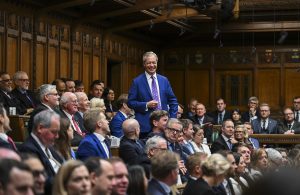Approaching the Holyrood election, expected to take place in May 2026, it should come as little surprise that energy policy is moving to the forefront of political debate.[1] Scotland continues to lead the UK in renewable power generation and remains a net exporter of electricity.[2] As such, the energy industry embodies key debates around economic opportunity, national sovereignty, and decarbonisation. In this article, Brevia Energy examines how the Labour Party is positioning itself to appeal to the Scottish electorate as the Party of green growth and energy security.
The Caledonian Cornerstone of DESNZ
Following the recent Government reshuffle, there are now two Scottish ministers in the Department for Energy Security and Net Zero, an important indicator of Scotland’s centrality to Labour’s Plan for Change.[3] Michael Shanks MP and Martin McCluskey MP represent constituencies with a strong industrial legacy, from coal mining and steelworks in Rutherglen to shipbuilding in Inverclyde.[4] [5] Their presence in DESNZ reinforces Labour’s wider message that this is a Government ‘for working people’.[6] It also reflects the Party’s emphasis on ensuring that the economic and community benefits of clean power – including job creation, union engagement, and regional investment – are tangible across Scotland’s post-industrial regions.[7]
Energy Sovereignty
Energy has long been intertwined with questions of Scotland’s national sovereignty. A decade ago, North Sea oil symbolised Scotland’s economic potential and control over natural resources during the 2014 Independence Referendum.[8] While oil prices have since fallen, and focus has shifted toward Net Zero, debates around who should steer Scotland’s energy future remain salient.
This month, the Scottish Government published its Independence paper, outlining proposals to ensure that Scottish energy production delivers direct benefits to communities through local investment.[9] At the SNP Conference, Stephen Flynn MP argued that the UK Government’s growing investment in nuclear projects elsewhere in the UK was part of a long-term effort to prepare for a potential independent Scotland.[10]
Meanwhile, Labour has sought to reframe the debate around self-determination. In his address to the Labour Party Conference, Energy Secretary Ed Miliband MP criticised the SNP’s continued opposition to new nuclear developments in Scotland.[11] He suggested that the policy prevents Scottish communities from accessing the benefits of large energy investment. He also positioned nuclear power as a pillar of national energy security, highlighting its role in providing reliable, dispatchable generation.
Thus, nuclear energy has emerged as both an economic and political fault line, intersecting debates over Scotland’s long-term energy mix.
A Just Transition for Scottish Workers
The Labour Government is vulnerable to criticism over its management of the clean energy transition. Today, the UK Government has published its Clean Energy Jobs Plan, outlining how it will reskill the existing workforce.[12] The Labour Party has argued that this represents a necessary long-term shift.[13] However, the impact of these plans is yet to be felt by Scottish voters.
Concurrently, a recent report by Future Economy Scotland revealed that, for every low-carbon electricity job created in Scotland between 2014 and 2023, three oil and gas jobs have been lost.[14] As a result, arguments made by the Leader of the Opposition, Kemi Badenoch MP, to prioritise ‘maximising extraction’ to get ‘all our oil and gas out of the North Sea’ and protect existing Scottish jobs are likely to resonate at the ballot box.[15] Labour may argue that these job losses stem from Conservative policies over the last decade. Nonetheless, it will be a challenge to persuade voters that a just transition lies ahead, having already journeyed through a decade of decline down the path of ‘clean power’.
Conclusion
As Scotland heads towards the 2026 Holyrood elections, Labour faces competing pressures, with threats from all political angles, including from the SNP and Conservative parties. It must deliver on its promise of green growth, addressing the economic scars of industrial decline, and navigating enduring questions of national sovereignty. The Party has positioned itself as the driver of clean energy and jobs, but translating that plan into voter confidence will be imperative.
Brevia Energy is a dedicated division of Brevia Consulting, and has a longstanding reputation for its expertise and experience in the Energy Sector.
To organise a discussion with Brevia Energy on how we can help you and your organisation, please get in touch via the link here. You can also contact the Brevia Energy Team on 020 7091 1650 or email contact@brevia.co.uk
[1] The Scottish Parliament, Elections, ND, Link.
[2] Business for Scotland, Scotland is an Economic Powerhouse 2: Energy, 1 July 2025, Link.
[3] Department for Energy Security and Net Zero, Our Ministers, ND, Link.
[4] UK Geoenergy Observatories, A legacy not forgotten; honouring the history of mining, 12 October 2023, Link.
[5] Inverclyde Council, Inverclyde Ships, ND, Link.
[6] Labour UK, About Us, ND, Link.
[7] Labour UK, Secretary of State for Energy Security and Net Zero, Ed Miliband’s Speech at Labour Conference 2025, 8 October 2025, Link.
[8] Politico, Scottish nationalists’ love of North Sea oil sours, 17 November 2020, Link.
[9] Scottish Government, A Fresh Start with Independence, 8 October 2025, Link.
[10] The National, Labour ‘investing in nuclear due to fear of Scottish independence’, 12 October 2025, Link.
[11] Labour UK, Secretary of State for Energy Security and Net Zero, Ed Miliband’s Speech at Labour Conference 2025, 8 October 2025, Link.
[12] UK Government, Clean Energy Jobs Plan, 19 October 2025, Link.
[13] Labour UK, Secretary of State for Energy Security and Net Zero, Ed Miliband’s Speech at Labour Conference 2025, 8 October 2025, Link.
[14] Future Economy Scotland, Delivering a Just Transition for Scotland’s Fossil Fuel Workers, October 2025, Link.
[15] The Guardian, Tories would maximise North Sea oil and gas extraction, Badenoch to say, 31 August 2025, Link.



